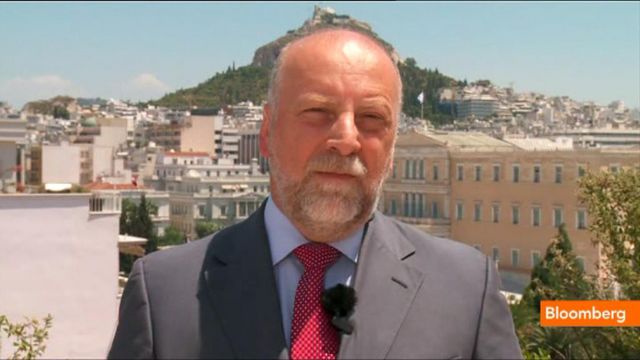Photo: To Vima
The new Greek government must meet its obligations to creditors and focus on privatization, which will be the first positive signal to world markets that something in the troubled Mediterranean economy has started changing. This opinion was shared by the participants in the second day of the Roundtable with the Greek government, which The Economist magazine organized in Athens for the 16th consecutive time.
Head of the European Commission’s Task Force for Greece, Horst Reichenbach, (on the left in the photo) stressed that privatization is the future of the Greek economy. He and his team are working on reforming the public administration in order to reduce bureaucracy by 25%. Experts have found out that there is a slight improvement in the procedures for starting a new business, but it is far from the best practices in Europe. For a start, the group will focus its efforts on the food industry, retail, tourism and construction.
Reichenbach announced that British and German experts are already working on the optimization of the Greek tax system, and Dutch technocrats have undertaken to improve the Greek customs.
Costas Mitropoulos, Chief Executive Officer, Hellenic Republic Asset Development Fund, expressed his confidence that privatization is the only way to stimulate economic growth and reduce the public sector. "We have no time. We must act immediately. We cannot afford more discussions as a country. Greece has undertaken a very ambitious plan to make privatizations worth 50 billion euro. Our agency was established on 1 August last year. It had no infrastructure, not a single employee. I was the first employee appointed in it," he recalled.

The country has already announced tenders and received letters from investors interested in six sites, including the state lottery, the gas company DEPA, the old airport and the International Olympic Radio and Television Centre. Only the old Athens airport drew the interest of eight investment companies and it promises to become the biggest urban recovery project in Europe. Another group of projects are ready to be tendered, including large companies such as the water supply company and Hellenic Petroleum.
There is another wave of privatization, which will include infrastructure such as airports and ports. It will help promote tourism in the country. Privatization of roads and railways will again put the country on the map of global trading, which will improve the lives of hundreds of thousands of Greeks.
"What are we waiting for? We are waiting for our managing board to convene, which has not met since April due to the second elections," Costas Mitropoulos admitted. Supply is not enough for privatization. There must be demand and Greece has been isolated from international markets. "You are not a subject for the Investment Committee, an investor told me. Another one admitted - if I wanted to invest in Greece I would do it in government bonds where my profit would be more than 5% compared with an investment in enterprises, the profit of which would be 2% in the best case and it would not be certain," the head of the Asset Development Fund explained investors’ perceptions for Greece.
Costas Mitropoulos, however, noted a large difference in public opinion, which is already strongly supporting privatization. A recent poll by the MRB agency shows that 85% of respondents support it and 74% believe that private entrepreneurs are better managers than the state. "Privatization is the third part of the puzzle we are trying to solve after the reduction of debt, the PSI and the reduction of the public sector. Privatization is the key test of confidence in Greece; it can prove that something is being done here, we can give a good example," he concluded.
"In modern economies, economic growth comes from the private sector and investment. There is no investment without investors just as there are no employees without employers. The Greeks have never understood this truth. They demonized foreign business and made the word profit shameful," Notis Mitarakis (on the right in the main photo), Deputy Minister of Development, said in his speech at the forum.
He stressed that the public sector cannot be an investor no matter how much it spends from the budget. "The problem is not the amount of state employees, it is rather their quality. If they work efficiently, no one will require their dismissal. Our priority is to make the public sector more efficient by improving the procedures under which it acts rather than resorting to dismissals," he said. Notis Mitarakis drew attention to the tax system in Greece, which should be more competitive.